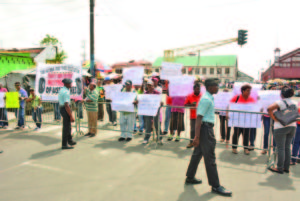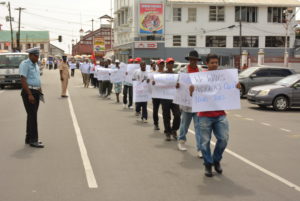
ban on used tyres as parliamentarians met in the National Assembly
Protestors representing three separate causes are now questioning the true meaning of democracy – as are some Parliamentarians – after the Police imposed restrictions on their picketing exercise on Monday.
Stakeholders against the closure of the Guyana Sugar Corporation (GuySuCo) estates, those against the imposition of Value Added Tax (VAT) on private education, and those against the ban on used tyres, turned up to stage a peaceful picketing exercise directly outside of Parliament Building – in clear view of the sitting Members of Parliament – but were prohibited from so doing.
Instead, they were made to remain behind the barricades erected at the eastern and western ends of the Parliament Square, even though they were not noisy. Consequently, in their bid to get the attention of Government ministers to their concerns, they had to resort to waving the placards they were carrying.
Dr Frank Anthony, a Member of Parliament (MP) for over ten years, said he had never previously witnessed a situation in which disgruntled taxpayers were banned from protesting outside of Parliament Building.
“It is the first time that I am seeing that people are not allowed to come out and do a peaceful picketing… These people are here to get the Government’s attention, and they are being prevented from doing peaceful protests to bring this to the Government’s attention. I think something is really wrong with our democracy,” he declared.
 Positing that the people have a right to have their voices heard, Dr Anthony has sympathised with the people for the way they have been treated.
Positing that the people have a right to have their voices heard, Dr Anthony has sympathised with the people for the way they have been treated.
He was one of a number of Opposition MPs who came out from Parliament Buildings to join the protestors.
Motivated, some bold protestors forced their way through the barricades and joined their representatives, to walk in circles outside of Parliament. And in an attempt to control the situation, police succeeded in pushing only three protestors back behind the barricades.
Jonathan Yearwood – a student protesting the education tax – could not believe his eyes, as he also questioned whether or not he was living in a democratic nation.
“We, the people who would like to protest things happening in our country, have not been allowed to come directly in front of Parliament. We’ve been banished to the western end of Parliament, where we can’t see any of the Parliamentarians driving in. They are ‘winded’ up in their tinted glass vehicles; they pretend not to see you, you can’t get close to them. Is this the kind of democracy we asked for? We should be able to be in touch with our Parliamentarians whenever there is Parliament,” he vented.
Yearwood said the protesters received a phone call from the police on Monday, notifying that the planned protest had not been given police permission.
“Since when do we need Police permission to protest in front of Parliament on the day the Parliament is taking place? They said we are free to protest any other day, but not on the day Parliament is taking place. How stupid is that?”
“Why would we come and protest an empty building, when nobody is inside there? We need to protest when the Parliament is going on, when the Parliamentarians are here, so they could come and see what we are protesting about. This is absolutely ridiculous from our Government, who is saying that they are going to be free and fair and that everybody is supposed to have a good life. Well, this is certainly not it,” the protestor said.
Protests
Persons have vented their frustrations at decisions made by this Government seemingly without any consultations with the industry players. As was ventilated previously, stakeholders in the used tyre industry want Government to reverse its decision to ban the used product.
Sugar workers and other concerned stakeholders have also protested Government’s decisions regarding this industry, particularly its decision to close the various estates. And although represented by a few persons, stakeholders have again called for the removal of VAT on private education.



